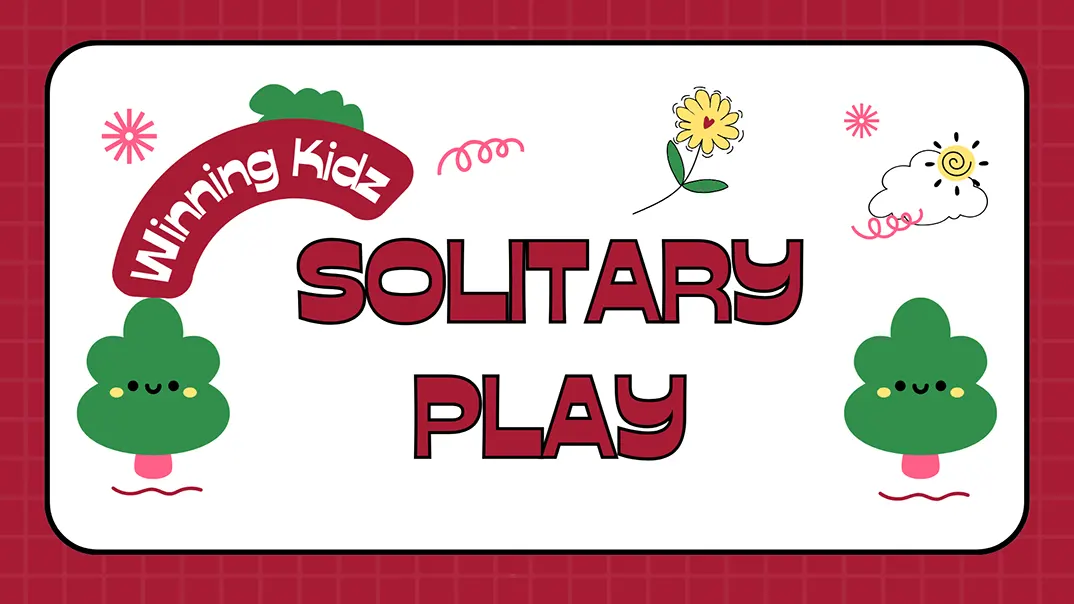Solitary play in early childhood is a powerful, yet often misunderstood, stage of development. Far from being a red flag, it’s a natural and healthy behavior that promotes independence, cognitive growth, and self-expression.
During solitary play (independent play), children engage in activities alone, free from external influence or social dynamics. This unstructured, self-directed time encourages curiosity, cognitive growth, and self-expression.
In this article, we will explore what solitary play truly means, its developmental significance, and how parents and caregivers can support it to nurture confident, imaginative, and self-reliant young learners.
What Is Solitary Play?
Solitary play, also known as independent play, refers to a form of play in which children engage in activities alone, without interacting with peers or adults. It typically appears in early childhood, especially in toddlers and young preschoolers, as a natural and important part of their developmental process. During solitary play, children are often deeply focused, using toys, materials, or their imagination to explore the world on their own terms.
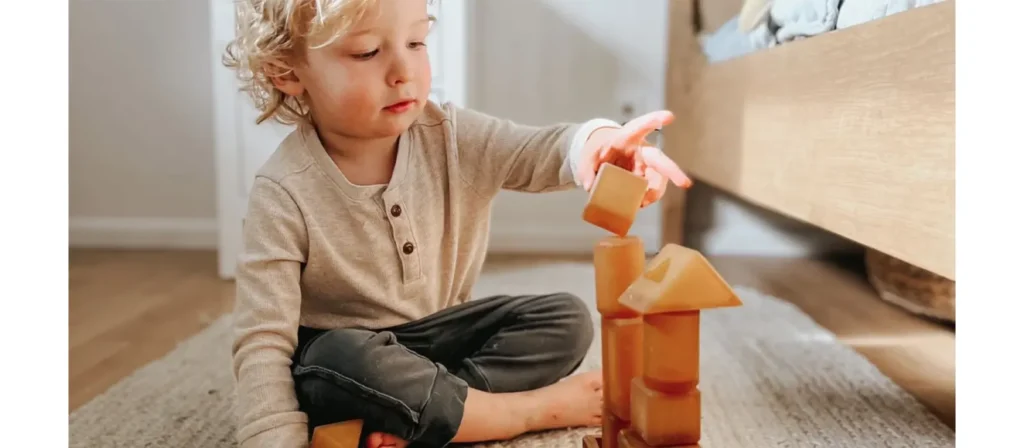
Unlike social or juego cooperativo, solitary play does not involve shared goals or communication with others. Instead, it offers children the opportunity to develop self-sufficiency, concentration, and creativity. Children participating in solitary play can make their own choices, follow their own interests, and experience the freedom of unstructured learning.
Solitary play can occur at various stages, even into later childhood, especially when children are processing emotions, seeking calmness, or engaging in personal interests. It is also a valuable tool for building confidence. Children learn that they are capable of entertaining themselves, solving problems independently, and expressing their creativity without relying on external validation.
Psychological Theories Behind Solitary Play
Solitary play is well-documented in early childhood development, especially through the work of Mildred Parten, who identified it as the second stage of social play. While not all classical theories directly study solitary play, several provide valuable context for understanding its cognitive and emotional value.
- Parten’s Stages of Play
Solitary play is the second stage in Parten’s widely recognized play development model. It typically appears in toddlers between 1 and 3 years old. At this stage, children are actively exploring materials alone, showing little interest in what others are doing around them. This is not a sign of social delay, but a normal phase of learning and self-discovery. - Desarrollo cognitivo Theories
Although Piaget did not name solitary play specifically, his theory emphasizes that children learn best through hands-on exploration. Many forms of solitary play align with the ways children construct knowledge during the sensorimotor and preoperational stages. - Theories of Autonomy and Initiative
From Erikson’s psychosocial theory, solitary play can be seen as a way for children to build autonomy and take initiative. Independent play supports their need to feel capable and self-directed during the early years of identity formation.
Transforme su aula con soluciones de mobiliario a medida
Examples of Solitary Play Activities
Children engage in solitary play through a wide range of activities that encourage self-direction and imaginative thinking. These moments may look simple from the outside, but they are full of learning opportunities that support emotional, cognitive, and motor development. The key feature of solitary play activities is that they are done independently, without prompting or participation from others. Here are several common solitary play examples:
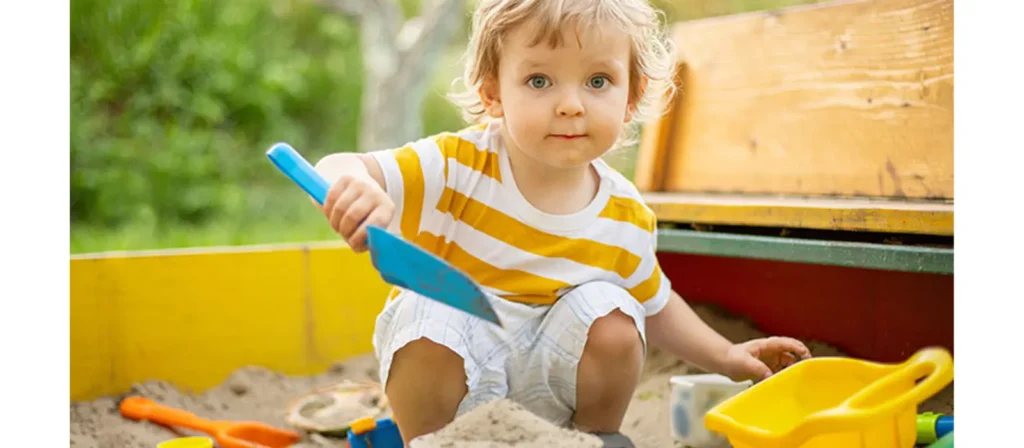
Infants (Birth to Around 12 Months)
During infancy, solitary play begins with simple sensory and motor exploration. Infants play alone, often observing, reaching, or reacting to sounds and textures.
- Sorting or stacking bowls or cups
- Looking at bright pictures in board books
- Holding and staring at a stuffed animal
- Using a baby gym with hanging toys
- Banging a surface with an object
- Watching ceiling fans or moving mobiles
- Grasping and mouthing soft toys
Toddlers (1 to 3 Years Old)
As toddlers grow, their solitary play becomes more purposeful and imaginative. They start exploring simple tasks and make-believe scenarios independently.
- Completing a simple puzzle
- Playing with building blocks or LEGO
- Flipping through a picture book
- Drawing or coloring independently
- Pretend play with dolls, cars, or animal figures
- Holding a tea party with toy dishes
- Playing with sensory bins (rice, water, sand, etc.)
- Creating structures with magnetic tiles
- Using play-dough to mold shapes alone
The Benefits of Solitary Play in Early Childhood
Solitary play is more than just a child playing alone. It is a valuable part of early childhood development that supports a wide range of essential skills. While it does not involve direct interaction with others, this form of play helps children grow emotionally, socially, and cognitively in meaningful ways.
Fomenta la independencia
One of the most significant benefits of solitary play is the development of independence. When children play alone, they learn to rely on themselves for entertainment, decision-making, and problem-solving. This autonomy fosters a strong sense of self and prepares children to manage tasks without constant guidance or approval from others.
Enhances Concentration and Focus
Solitary play allows children to become deeply engaged in their activities without external distractions. Whether they are building with blocks, flipping through a book, or drawing a picture, they can focus on a task for extended periods. This ability to concentrate is essential for future academic learning and goal-setting.
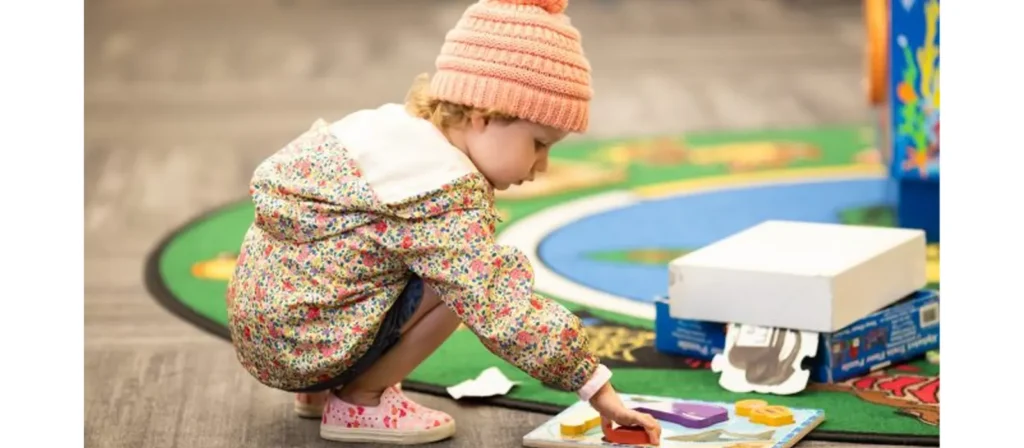
Promueve la creatividad y la imaginación
When children play alone, their imagination takes center stage. They invent scenarios, create stories, and explore possibilities using only their thoughts and available materials. This type of open-ended, imaginative play helps develop creative thinking skills that are beneficial across all areas of life.
Strengthens Problem-Solving Skills
Solitary play often involves figuring things out independently. Children may need to solve a puzzle, build a tower that does not collapse, or figure out how to make a toy work. These small challenges build resilience and critical thinking abilities, helping children approach problems with confidence and persistence.
Supports Emotional Regulation
Playing alone gives children the space to process emotions in a safe and calming environment. It can serve as a quiet time to decompress, especially after stimulating social interactions or transitions. Solitary play encourages self-soothing behaviors and helps children manage stress more effectively.
Builds Confidence and Self-Esteem
As children engage in solitary play and achieve success on their own, their self-esteem naturally grows. They begin to see themselves as capable, creative, and independent thinkers. These early experiences of personal achievement lay the groundwork for a positive self-image.
Transforme su aula con soluciones de mobiliario a medida
Develops Decision-Making Skills
Without the influence of peers or adults, children in solitary play must decide what to do, how to do it, and when to move on to something new. These simple choices strengthen decision-making abilities, which are essential for developing autonomy and responsibility.
Improves Fine Motor Skills
Many solitary play activities, such as coloring, stacking blocks, or manipulating small toys, involve precise hand and finger movements. These actions contribute to the development of habilidades motoras finas, which are necessary for writing, self-care tasks, and many everyday activities.
Lays the Foundation for Social Development
Children who are comfortable playing alone often become more secure and confident when they later engage in group play. Solitary play helps them build internal resources that support healthy relationships.
Ways to Support Children Who Prefer Solitary Play
Some children naturally gravitate toward solitary play more than others. This preference is not something that needs to be “fixed” but rather understood and supported. Children who enjoy playing alone often possess strong internal motivation, creativity, and focus. With thoughtful guidance, adults can help these children thrive while also encouraging healthy social development at their own pace.
1. Respect Their Temperament and Preferences
Some children are naturally introverted or reflective. These children may need more time alone to recharge and feel comfortable. Rather than pushing them into social settings too quickly, allow them to regulate their own level of interaction. Gradually introducing social play opportunities can be helpful, but only when the child is ready.
2. Provide a Safe and Stimulating Environment
Create a play space where children feel safe, comfortable, and inspired. Include age-appropriate toys, books, art supplies, and sensory materials that promote exploration. Organize the space so that children can access materials independently, encouraging autonomy and uninterrupted play. A clutter-free, inviting environment helps foster longer and more meaningful solitary play sessions.
3. Offer Open-Ended Materials
Toys that encourage imagination and creativity are ideal for solitary play. Blocks, puzzles, drawing tools, figurines, and nature-based objects provide endless opportunities for self-guided learning. Avoid toys that have a single function or outcome, as they can limit a child’s ability to explore and invent.
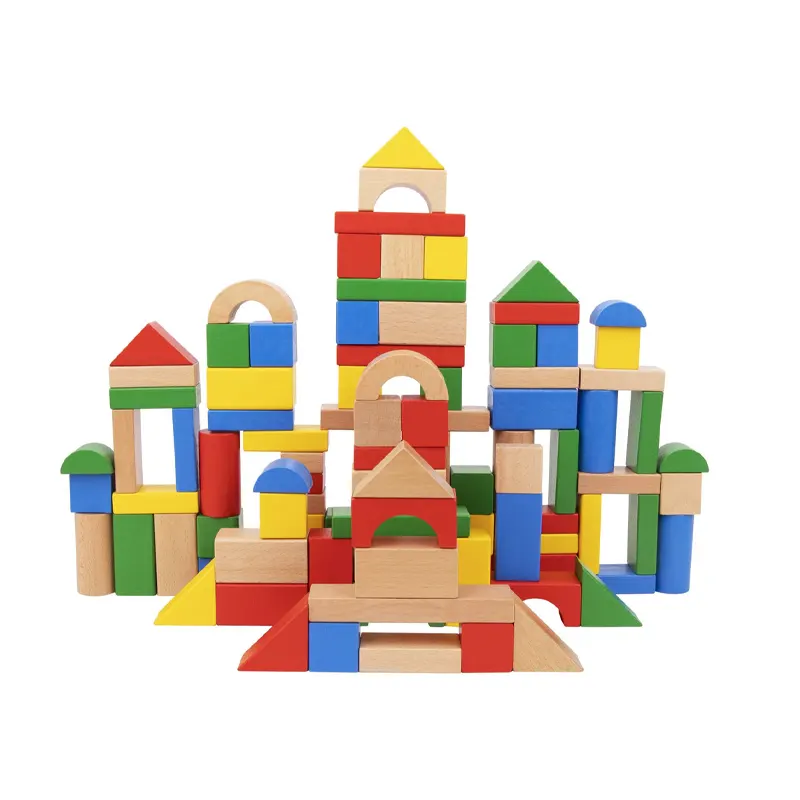
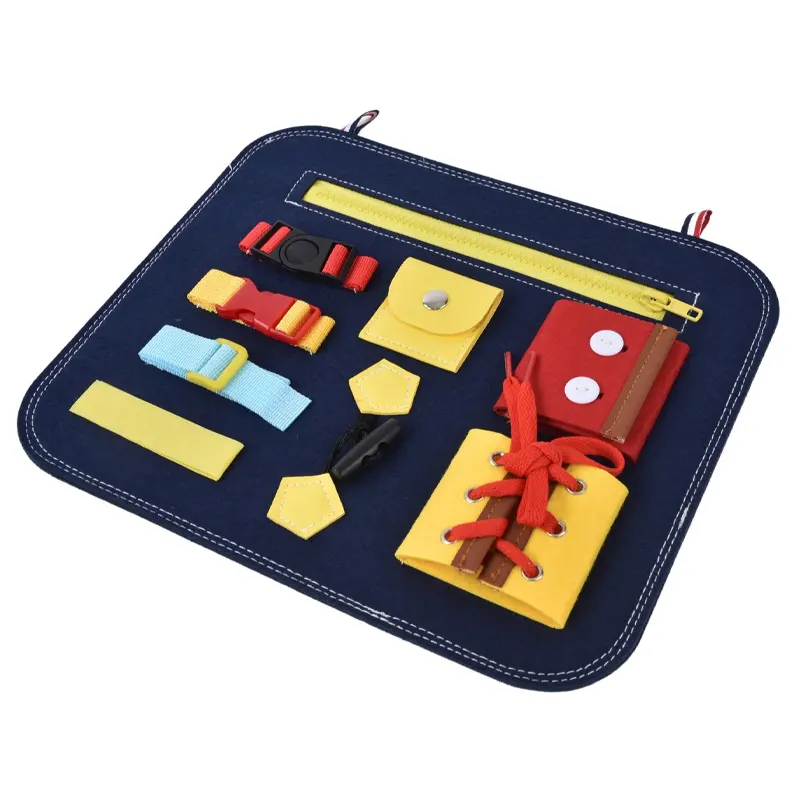

Toys for Solitary Play:
- Wooden building blocks
- Stacking cups or nesting toys
- Magnetic tiles
- Art supplies (crayons, markers, paint, paper)
- Modeling clay or play-dough
- Pretend play toys
- Puzzle boards and jigsaw puzzles
- Busy boards or sensory boards
- Picture books and board books
- Musical instruments for toddlers (xylophone, tambourine)
Descubra toda nuestra gama de productos
Acceda a nuestro completo catálogo de mobiliario y equipos de juego de alta calidad para guarderías y escuelas.
4. Gently Encourage Social Interaction Without Pressure
If a child prefers solitary play most of the time, it does not necessarily mean they are socially behind. However, you can still help them build social skills by offering opportunities for parallel play, where children play side-by-side without direct interaction. Over time, this may naturally lead to more interactive play as comfort grows. Offer group settings as an option rather than a requirement.
5. Use Refuerzo positivo
Celebrate the skills and focus children demonstrate during solitary play. Positive feedback helps reinforce their confidence in independent learning. Simple comments like “I love how focused you were building that tower” or “You came up with a very creative story” show appreciation without intruding.
6. Watch for Changes in Behavior
While solitary play is normal, sudden shifts—such as withdrawing from peers after previously enjoying social play—may indicate emotional stress or other concerns. Keep communication open and monitor for signs that may suggest the need for additional support. In most cases, solitary play is simply a personal preference, but being attentive ensures that the child is emotionally well.
7. Balance Solitary and Social Opportunities
While solitary play offers immense benefits, children should also have chances to interact with others at their own pace. Provide a balanced routine that includes both independent and social experiences, such as story time, group meals, or outdoor play. This helps children develop holistically while respecting their comfort zones.
Common Misconceptions About Solitary Play
Although solitary play is a normal and beneficial part of early childhood development, it is often misunderstood. Some adults may feel concerned when a child prefers to play alone, especially in group settings. Clarifying these misunderstandings can help parents and educators better support children’s individual learning styles and emotional needs.

1. “Playing alone means a child is lonely or sad.”
Many children choose to play alone because they enjoy the activity, not because they feel excluded. Solitary play can be peaceful and deeply satisfying, especially for children who are naturally reflective or imaginative.
2. “Solitary play shows poor social skills.”
Solitary play is developmentally appropriate and not a sign of social delay. In fact, it often occurs alongside healthy social development. Children who enjoy playing alone can also be kind, observant, and socially aware.
3. “Children should always be encouraged to join group play.”
While group play is valuable, constant encouragement to join others may overwhelm children who need quiet time to recharge. A balance of solitary and social play supports emotional well-being and respects each child’s unique temperament.
4. “Solitary play is only for shy or introverted children.”
All children, regardless of personality, benefit from time spent in independent play. Outgoing children may enjoy solitary play just as much as quiet ones, especially when they are deeply interested in a specific toy or activity.
5. “Adults should always guide or join in play.”
Adults don’t need to direct every play session. Giving children space to explore and make their own choices fosters independence and self-confidence. Observing from a distance is often more supportive than stepping in.
Transforme su aula con soluciones de mobiliario a medida
Recognizing Healthy Solitary Play and When to Seek Support
Solitary play in early childhood is often a positive sign of growth, imagination, and independence. However, as with any aspect of development, caregivers need to understand the difference between healthy solitary play and behaviors that may suggest a need for further support. Knowing what to look for helps ensure children are thriving emotionally, socially, and cognitively.
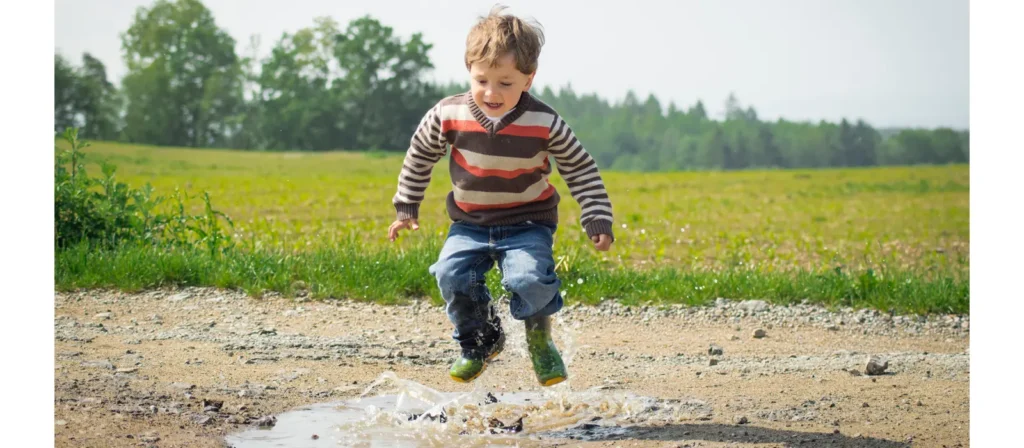
Signs of Healthy Solitary Play
When solitary play is developmentally appropriate and beneficial, it typically displays several encouraging signs. These behaviors reflect natural curiosity, emotional regulation, and intellectual engagement. Parents and educators can feel reassured when they observe the following:
- The child appears focused and content while playing alone
- Activities are self-initiated and purposeful, such as building, drawing, or storytelling
- The child returns to solitary play voluntarily after social interactions without any negative emotions
- There is a creative use of toys, such as inventing scenarios or characters
- The child shows progression in skills, such as more complex block towers or longer attention spans
- Solitary play is balanced with an occasional interest in playing near or with others
- The child can transition smoothly from solo play to group activities when necessary
These signs indicate that solitary play is being used as a healthy space for growth and reflection, not as a retreat from the outside world. It allows children to test their ideas, master new skills, and enjoy quiet time to process their environment.
When to Seek Professional Advice?
While solitary play is normal and often beneficial, there are cases where it may warrant closer observation. Some behaviors, especially if persistent or extreme, could signal underlying social, emotional, or developmental challenges. Parents and caregivers should consider seeking advice from a pediatrician, child psychologist, or early childhood specialist if they notice:
- The child consistently avoids all social interaction, even with familiar peers or adults
- Solitary play is the only type of play observed, without progression to parallel or cooperative stages
- The child displays signs of distress, anxiety, or frustration when others approach
- There is a noticeable lack of communication, such as delayed speech or limited gestures
- Repetitive behaviors dominate solitary play, without variation or imagination
- The child seems emotionally withdrawn or disconnected from their surroundings
- There is a regression in previously developed social or language skills
It is important not to panic if a child prefers to play alone, especially in the early years. Every child has their own temperament and pace of development. However, persistent patterns that interfere with other areas of growth may benefit from early intervention. Early support can help children overcome obstacles and build healthy social and emotional connections.
Transforme su aula con soluciones de mobiliario a medida
Conclusión
Solitary play is not something to worry about. It is a natural and important part of early childhood development, where children build confidence, independence, and creativity in their own quiet space. These moments of focused, self-directed play help children grow in ways that are just as meaningful as social interaction.
If you are a parent or educator, know that a child who prefers to play alone is not falling behind. They are simply learning in a way that feels comfortable and rewarding to them. Every child develops at their own pace, and solitary play can be a powerful tool for emotional and cognitive growth.
Instead of worrying when a child chooses to play independently, take a moment to observe. You may see concentration, imagination, and joy. Trust that this form of play matters. By providing space, understanding, and gentle support, you are helping that child grow into a confident and self-reliant learner.

